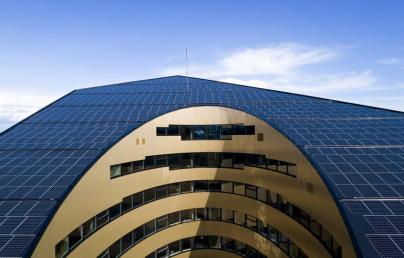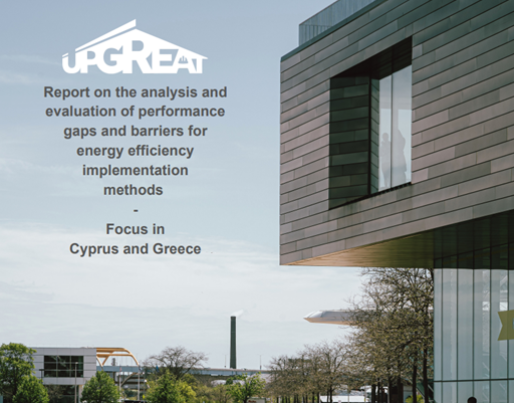
Performance gaps and barriers for energy efficiency implementation methods in Cyprus and Greece

Performance gaps and barriers for energy efficiency implementation methods in Cyprus and Greece
The primary goal of this report is to pinpoint and assess the gaps and barriers of the implementation of energy efficiency methods through a survey, with a specific focus on school buildings. The survey targeted stakeholders in the building sector, including both professional and non-professional individuals, from Cyprus and Greece.
Recognising the societal advantages of improving energy efficiency in buildings, European policies have been encouraging building renovations since 2002, facilitating the transition towards green practices. As a result, various renovation strategies and several "high performance" solutions emerged since then to enhance energy efficiency.
However, inconsistencies have arisen between the projected, calculated, and actual energy performance of buildings during their operational phases. These disparities impede the full realisation of deep energy renovations' potential. Consequently, there exist gaps and obstacles in the implementation of energy efficiency methods that must be addressed to ensure high energy efficiency standards.
In the wake of intersecting crises, such as the climate crisis, the convergence of conflicts and the recovery from the pandemic, the European Union (EU) has set high energy and low carbon emission efficiency standards. One critical sector tasked with confronting these challenges head-on is the building sector. Deep energy renovations (DER) in buildings have emerged as a powerful tool to meet these standards while simultaneously boosting economic recovery. With annual energy renovation rates expected to double over the next decade, the building sector is poised to play a pivotal role in achieving the EU's high energy efficiency goals by 2050. To harness the potential of DER and meet these goals, the construction sector and building experts are urged to upskill their workforce. This call to action extends beyond mere compliance; it necessitates a profound shift in approach. Building professionals must not only meet energy efficiency targets but also embrace innovative approaches and technological solutions to ensure high-quality construction and enhance the energy performance of buildings.
UPGREAT Project
However, the path towards widespread DER implementation is not without its challenges. In this context, the UPGREAT project, a EUKI funded project, takes center stage. This initiative focuses on identifying and addressing the barriers and gaps hindering energy efficiency implementation methods in Greece and Cyprus, with a particular emphasis on school buildings. The UPGREAT project employed a targeted survey for building experts, delving into technical, financial, and policy issues that may pose challenges to further boost building renovations, especially in the context of educational facilities. By assessing the experiences and insights of building experts involved in DER projects, the UPGREAT project aims to identify these obstacles and gaps in energy efficiency implementation. The survey methodology is the first step in UPGREAT's overarching goal: the development, application, and dissemination of a Total Training Toolkit—a comprehensive educational package. This toolkit will serve as a valuable resource for capacity building among different target groups involved in energy renovations in buildings.
According to the report, survey findings revealed that progress toward more energy efficient buildings is hampered by building professionals' inadequate knowledge, as well as a lack of innovative financial services. These problems are exacerbated by poor legislative frameworks and bureaucratic procedures, which create hurdles that are only likely to be overcome with tremendous personal effort from building professionals. To solve this equation, it would need a mix of training, financial motivation and organization as well as sophisticated policy making based on a thorough understanding of each actor and how they engage. More on the findings, available here.
In conclusion, by identifying and addressing barriers, UPGREAT aims to empower building experts with the knowledge, tools, and skills necessary to lead the charge towards a sustainable and energy-efficient future. As Cyprus and Greece embark on their journey to meet EU standards and contribute to a greener, more resilient world, UPGREAT stands as a testament to the power of innovation and collaboration in the face of formidable challenges.
Report-on-the-Analysis-and-Evaluation-of-Performance-Gaps-and-Barriers-for-Energy-Efficiency-Implementation-Methods.pdf
English (11.51 MB - PDF)
